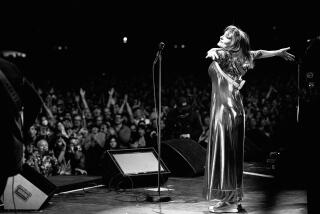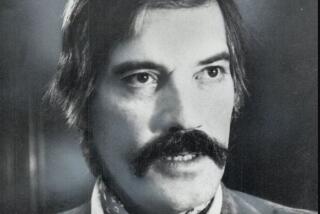POP MUSIC REVIEW : The Psychedelic Furs Do It Their Ways
- Share via
ANAHEIM — Do you want it nice and easy, or nice and rough? With the Psychedelic Furs, you get the old Ike-and-Tina choice.
Over the past decade, the British band has alternated between churning up sandstorms of dense, distorted sound, and laying down winsome pop with gentle surfaces and enticing melodies. The Furs have made memorable music doing it both ways, and Tuesday night at the Celebrity Theatre they did justice to each approach.
Some admirers of the band’s earlier, noisier incarnation tend to discredit the pop fluency that evolved by the Furs’ third album, “Forever Now.” Now, with its new album, “Book of Days,” the band has returned to the sonic maelstrom approach. The first half of its show at the Celebrity was devoted primarily to songs from the new album, and to older material, such as “Sister Europe,” that also featured opaque, layered sound.
With the four-man core band augmented with an extra guitarist and keyboard player, the Furs had no trouble thickening the sonic winds swirling around Richard Butler’s foghorn croak of voice. The segment showcased the controlled wails and broad textural washes of lead guitarist John Ashton, one of the more underrated players in the no-single-note-solos school of British guitar. But before long, a sense of droning sameness set in, and one began to wonder whether the Furs were going to repudiate their pop tendencies and linger in murk for an entire show.
Then, like a beam shooting through clouds, “Heaven” came shining with its firm, clear melodic and rhythmic surge. It was the first in a troika of romantic pop songs that gave the show a needed lift around the halfway mark. Among the highlights in the 95-minute concert’s strong second half were two new songs: “House,” whose affirmative energy stands out amid the deep melancholy of the “Book of Days” album, and the concluding acoustic ballad, “Torch,” which wallowed prettily in sad melancholy with hired sideman Knox Chandler providing warm tones on cello.
It was especially gratifying to hear the Furs play “Love My Way” during the romantic segment of the show--not only because the 1982 hit is a pretty, haunting piece of pop craft, but because it is one of the best ‘80s examples of pop music’s capacity to insinuate convention-dashing ideas into the media mainstream.
Anti-homosexual sentiment is the social convention that “Love My Way” challenges in its own oblique (thanks partly to Butler’s indecipherable singing), low-key way. In the song, Butler gives an admiring, supportive nod to people committed to loving even in the face of opprobrium. When such a message can be carried gracefully into the back yard of the Rev. Louis Sheldon, rock is doing its job.
The Furs music was augmented by good, mood-setting lighting effects that most often bathed the stage in violets, blues and greens (on the technical downside, the show was hampered by persistent and annoying buzzes and crackles in the sound system). Butler, something of a dandy in past performances, was anything but that this time. Dressed in swaddling layers of flannel, he looked more like a Dickensian pickpocket than the Prince Hamlet of past shows. While he sounded a bit under the weather, which made his voice more froggy than usual when singing (and like a deathbed rasp during his minimalist song introductions and applause acknowledgements), Butler was an energetic, naturally theatrical performer who at times whirled about like a kid playing helicopter.
The show was also a tacit exercise in self-criticism, as the Furs pointedly avoided playing anything from “Midnight to Midnight,” the tepid 1987 album that almost completely submerged the band’s appealing sense of mystery and lyrical invention in a bid for greater accessibility.
The opening band, East of Eden, ought to take note of that. The Boston band’s 35-minute set displayed strong musicianship and an appealing way with a pop hook, but there is nothing distinctive about its routine romantic sentiments or pat song constructions. Cinde Lager’s singing showed some smart influences--Kate Bush, Chrissie Hynde, Aimee Mann--but like a lot of new bands, East of Eden needs to figure out whether it has anything of its own to say, then learn to say it with a personal spark.
More to Read
The biggest entertainment stories
Get our big stories about Hollywood, film, television, music, arts, culture and more right in your inbox as soon as they publish.
You may occasionally receive promotional content from the Los Angeles Times.











